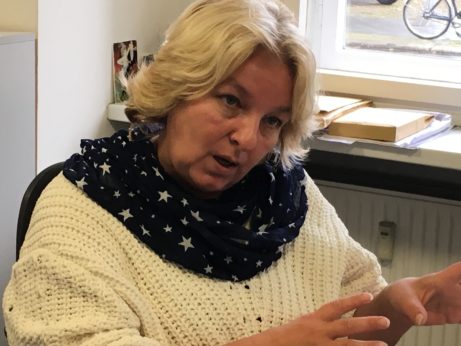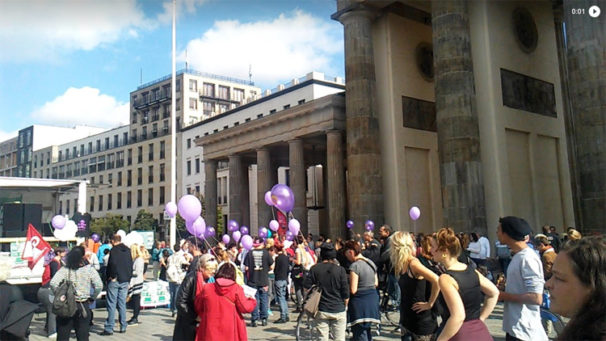
BERLIN—As election day, Sept. 24, draws nearer in Germany, street lantern poles all over this city are festooned with full-color images of handsome men, some of them smiling and others looking quite serious. Under the pictures, you see the names of the men and the labels of their political parties: CDU, SPD, and FDP among them.
The men are vying for some of the 600 seats up for election in the German Bundestag (parliament).
The pictures of the men plastered up all over this city (and the country, for that matter) tell you little or nothing about what they stand for.
The two parties expected to come in first and second respectively, the Christian Democrats (CDU) and the Social Democrats (SPD), rule together now in a “Grand Coalition.” The only thing as lackluster and non-issue-oriented as the pictures of the men these parties are backing was the single televised “debate” between the two leaders of those parties, the CDU’s Angela Merkel and the SPD’s Martin Schulz.
Germany’s Left Party (Die Linke), however, presents an entirely different picture. Its posters do not consist of smiling or serious-looking handsome men. Die Linke, which is fighting hard against the neo-Nazi Alternative for Germany (AfD) party for third place, operates under its own constitutional requirement that at least half the candidates it fields must be women.
All leadership bodies in the party must also have women in at least 50 percent of their slots. And for the top party leadership positions, no man can hold that position unless he has a female co-leader with equal power and responsibilities.
In keeping with this rule, the party has two national co-leaders, Katja Kipping and Bernd Riexinger, and the party is led in the Bundestag by two co-leaders, Sarah Wagenknecht and Dietmar Bartsch.
Some of Die Linke’s campaign posters feature pictures of women who are running for Bundestag seats, but most of them emphasize, instead, issues critical to the German electorate, including protection of social security and pensions, funding for schools, curbs on skyrocketing rents, protection of health care choices for women, and many others.
Check out PW Editor-in-chief John Wojcik’s previous stories from Berlin:
> Germany’s Die Linke aims to thwart neo-Nazi electoral strategy
> The Left Party offers the real alternative in Germany’s elections
> “Ossies,” former East Germans, compare socialist youth with life under capitalism
Vera Vordenbaumen, head of the party’s women’s committee, was interviewed at Die Linke’s national headquarters in Berlin’s Karl-Liebknecht-Haus. She spoke with us on an afternoon when she was busy on the phones rounding up support for a women’s rights demonstration last week. “Right-to-life” groups, backed by the AfD, were planning a march in Berlin, and Vordenbaumen said Die Linke was backing a planned counter protest.

“The ‘right to life’ movement is not as powerful here in Germany as it is in the U.S.,” Vordenbaumen said, “but it is something that has the potential to grow, resulting in taking away women’s choices and in turning the clock back here in Germany too.”
She described as “tragic” the fact that “in some parts of America women have to travel hundreds of miles in order to exercise choice and to protect their own health.” She was referring to the elimination of women’s health services in places in America that are under GOP control.
Vordenbaumen boasted about the fact that equal representation of women is written into Die Linke’s rules.
“This is a great thing and it attracts many women into supporting us,” she said. “And women’s issues are really everybody’s issues. When we campaign for good schools for our children and against evictions that result from increased rents, when we campaign for better health service, against cuts in pensions, against raising the pension age, and for taking money from the military and putting it to the people and their needs, we are campaigning for women and we are campaigning for everyone.”

She noted that of the 64 Die Linke members in the Bundestag, “I am proud to say that 35, more than half, are women.”
Vordenbaumen expressed deep concern about what she sees as the AfD’s opportunistic use of the abortion issue. “There are a lot of religious people who have deep reservations about the issue of abortion,” she said, “and Die Linke is a party that wants to reach to everyone. We have religious members who are deeply concerned about social justice and we want to work with all of them.”
She said the AfD has joined the anti-abortion rights cause primarily because it wants to lure groups like the Catholic Church, for example, into supporting them. She noted that an AfD poster showing a pregnant woman with the slogan, “We can make our own Germans,” was an attempt to combine anti-abortion and anti-immigrant sentiment. It’s also reminiscent of the propaganda campaigns that defined the years of Hitler’s Third Reich. During that time, women who had many children were given medals and ribbons as “awards” for giving birth to additional members of the so-called “master race.”
“The really important thing now is Election Day,” Vordenbaumen emphasized. “We must prevent the AfD from becoming the third party in the Bundestag. This is important for women, and it is important for everyone.”
Since the first and second parties, the CDU and the SPD, rule together in a “Grand Coalition,” the third party becomes the official opposition in the Bundestag, giving it the first right to challenge government positions and giving it the position of national budget director.
Many of the polls continue to show both Die Linke and the AfD polling around 10 percent, so the people at Karl-Liebknecht-Haus are not at all complacent. “We are fighting full time, 100 percent, every minute of every day,” said Andreas Gunther, head of the party’s Department of International Policy.










